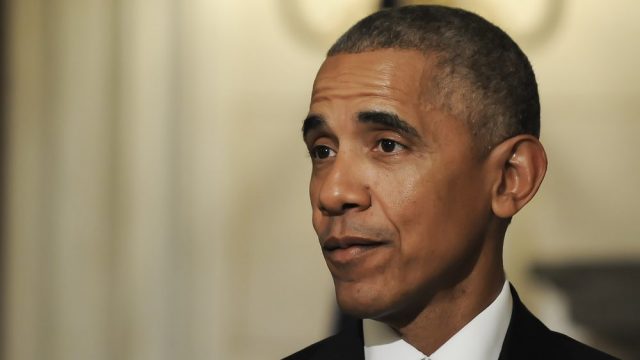
Let’s face it, the idea of Barack Obama squaring off against Donald Trump in a courtroom would be nothing short of show-stopping, even if it’s just a civil courtroom, and even if it’s not for impeachment purposes. By now, Obama must have had his fill of unfounded Trump-inspired accusations about everything from his citizenship to his religion; he would hardly appear thin-skinned if he attempted to hold Trump’s feet to the fire over claims of campaign corruption and misuse of power. Likely, though, even assuming Trump is lying about the wiretapping in the tweet below, there’s not much of a case.
Defamation (libel, for anything written, such as Trump’s tweet, and slander for anything spoken) has several requirements beyond simply proving that someone told a lie. For one, Plaintiff Obama would need to prove that the lie damaged his reputation. In many cases, the making of a negative false statement clearly damages the victim’s reputation; but when it comes to President Trump, things are markedly different. The combination of Trump’s serious credibility problem with Obama’s ever-skyward popularity simply does not add up to an obvious damage to reputation. Those who love Obama probably wouldn’t be swayed by anything President Trump says, and the haters would surely remain haters. Kind of a net-zero on the whole reputation thing.
Even if a fact-finder did believe Obama’s reputation could be harmed by Trump’s accusations, a successful defamation case generally needs to show proof of economic damages. Financial harm is difficult to quantify in any defamation case – but in the case of a former President, it would be near impossible. President Obama isn’t likely to reduce his speaking fee as a result of anything Trump says about him – regardless of whether the statements are true or false. He isn’t likely to miss out on consulting fees, book royalties, or any other professional endeavors either. Frankly, in today’s world, even if Obama had wiretapped Trump Tower, that fact would probably make the former-POTUS an even more valuable commodity. If Richard Nixon were alive today, I’m sure he’d have offers for everything to book deals to speeches to appearances on Dancing with the Stars.
Interestingly, the one usually problematic factor for high-profile defamation plaintiffs would be easier than ever to prove in an Obama v. Trump lawsuit. When a defamation plaintiff is a public figure, he or she must prove the false statement was made with “actual malice,” – meaning that the speaker or writer knew or had reckless disregard for the falsity. Proving actual malice isn’t easy, and can hinge on facts about the defendant’s state of mind, research history, and general carefulness. But even the most Trump-trusting fact-finder would have to acknowledge Trump’s propensity to lie, especially about all things Obama. In the past, Trump’s own lawyers have even acknowledged his tendency to be untruthful.
When under oath, Trump’s bankruptcy lawyer, Patrick McGhan said that Trump’s legal team always met with him in pairs, so they didn’t “have a problem of people lying.” And by “people,” Mr. McGhan meant “Trump.” When pressed on why such precaution would be necessary, Mr. McGhan explained, “we tried to do it with Donald always if we could because Donald says certain things and then has a lack of memory,” and described Trump as “an expert at interpreting things. Let’s put it that way.”
Would Donald Trump threaten litigation if someone had accused him of illegal wiretapping? Of course. But those empty threats are as much Trump’s signature as Obama’s calm demeanor is his. Plus, Obama is a lawyer, and surely knows how the tort of defamation works. Trump is constrained by no such knowledge, just as his relationship with facts is “alternative” at best.
[Image via Ververidis Vasilis/Shutterstock]